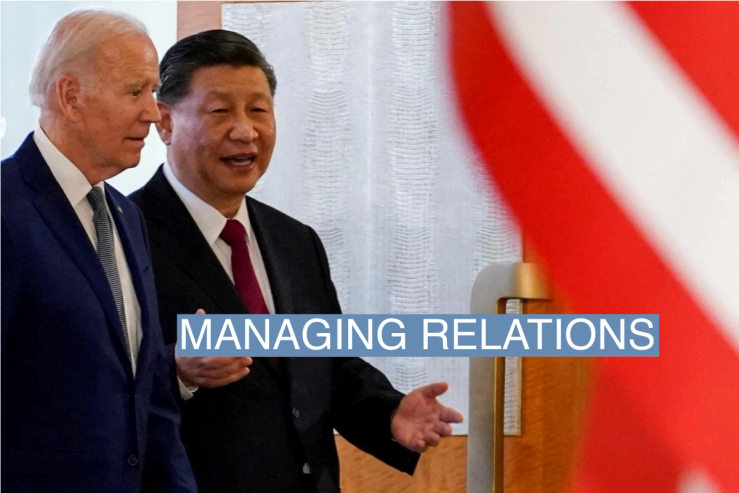The News
A Biden administration effort to screen private investments into a narrow set of technology sectors in China could eventually be expanded to other sectors with national security implications.
According to one person at a law firm in touch with the administration about the executive order, the Treasury Department sees the notification requirement in the directive President Joe Biden signed in August as “something that could potentially be expanded and grow.” That could make businesses wary of planning investments around the new enforcement regime as they look for certainty on the rules of the road.
Currently, the order directs the administration to screen and potentially block investments in three sectors in China that have military applications: Semiconductors, quantum information technologies, and artificial intelligence. The administration had been contemplating including biotechnology in the original order, but dropped it for a narrower set of sectors.
The language in the executive order itself calls for a review one year after the regulations take effect to recommend potential changes to the order, “including the addition or removal of identified sectors or countries of concern.”
“Basically, they’re treating this as a one-year pilot to be evaluated,” said a trade association source. The administration could easily “use the existing framework that they’re building to cover additional sectors or types of technologies if they decided to,” the person said.
The Treasury Department, which declined to comment for this story, is sifting through input from outside stakeholders as it finalizes the rules to implement the executive order, which are expected sometime next year. That means any changes are very far off, and could be thwarted if Biden loses reelection.
A senior administration official told reporters in August when Biden unveiled the executive order that there was “no expectation that we’re going to add additional areas during the rulemaking” and that the goal of the comment period is to provide as much “clarity” to those potentially affected as possible.
Emily Kilcrease, an expert on the U.S.-China economic relationship at the Center for a New American Security, said any effort by the administration to change the scope of the order would require another rulemaking process. She said the Biden administration is smart for planning regular review of the policy because of its novelty.
“It’ll be important not to just put these things on paper and let them live there for years,” she told Semafor.
In this article:
Know More
The executive order has been a point of tension between U.S. and Chinese officials, who are meeting this week as Beijing’s top diplomat, Wang Yi, visits Washington beginning Thursday. The issue also may have come up during virtual talks between senior Treasury officials and their Chinese counterparts this week.
White House national security adviser Jake Sullivan has characterized it as part of the administration’s “small yard and high fence” approach to protecting U.S. national security. Venture capital and private equity firms making the investments are required to notify the government of their plans.
Legislation on Capitol Hill offers some clues as to how it could be expanded beyond semiconductors, quantum, and AI. A bill introduced by Sens. John Cornyn, R-Texas and Bob Casey, D-Pa. that would make it law for companies to notify the U.S. government of planned investments in “countries of concern” covers a much broader array of sectors, like large-capacity batteries, hypersonics, satellite-based communications, and laser scanners.
Batteries are an obvious future target, said Kilcrease, who noted the dynamic is different than with other technology sectors where the U.S. has a clear leg up. China occupies a dominant position in the battery industry, which has become a source of concern for the U.S. as the Biden administration looks to jumpstart a transition to electric vehicles.
Morgan’s view
Even at this early stage, the fact that the Biden administration is talking about expanding this part of the executive order is significant. This program could eventually sweep up even more investments, promising greater disruption for the private sector.
That doesn’t mean there would necessarily be restrictions placed on all private investments into a wider array of sectors, but that the administration would be screening them. That would give U.S. officials even greater visibility into the flow of U.S. dollars and know-how into Chinese tech industries.
An expansion may do more to satisfy China hawks in Congress who have criticized the Biden administration for not going far enough. U.S. lawmakers could eventually try to codify the order or pursue their own expansion, but competing proposals on Capitol Hill have been stalled amid other gridlock.
Room for Disagreement
Pushback from the private sector could dissuade officials from eventually trying to expand the scope of the order. The Biden administration spent months working on the directive released in August and it faced repeated delays as the administration heard concerns from outside voices. There are a number of questions investors have about the executive order and its current scope, such as the degree to which it affects U.S. persons working for foreign nationals. The European Union reportedly lodged concerns with the Biden administration over potential impact on European companies.
Notable
Information the government collects due to the new investment screening program will provide useful economic intelligence for U.S. spies, Bloomberg reported.


